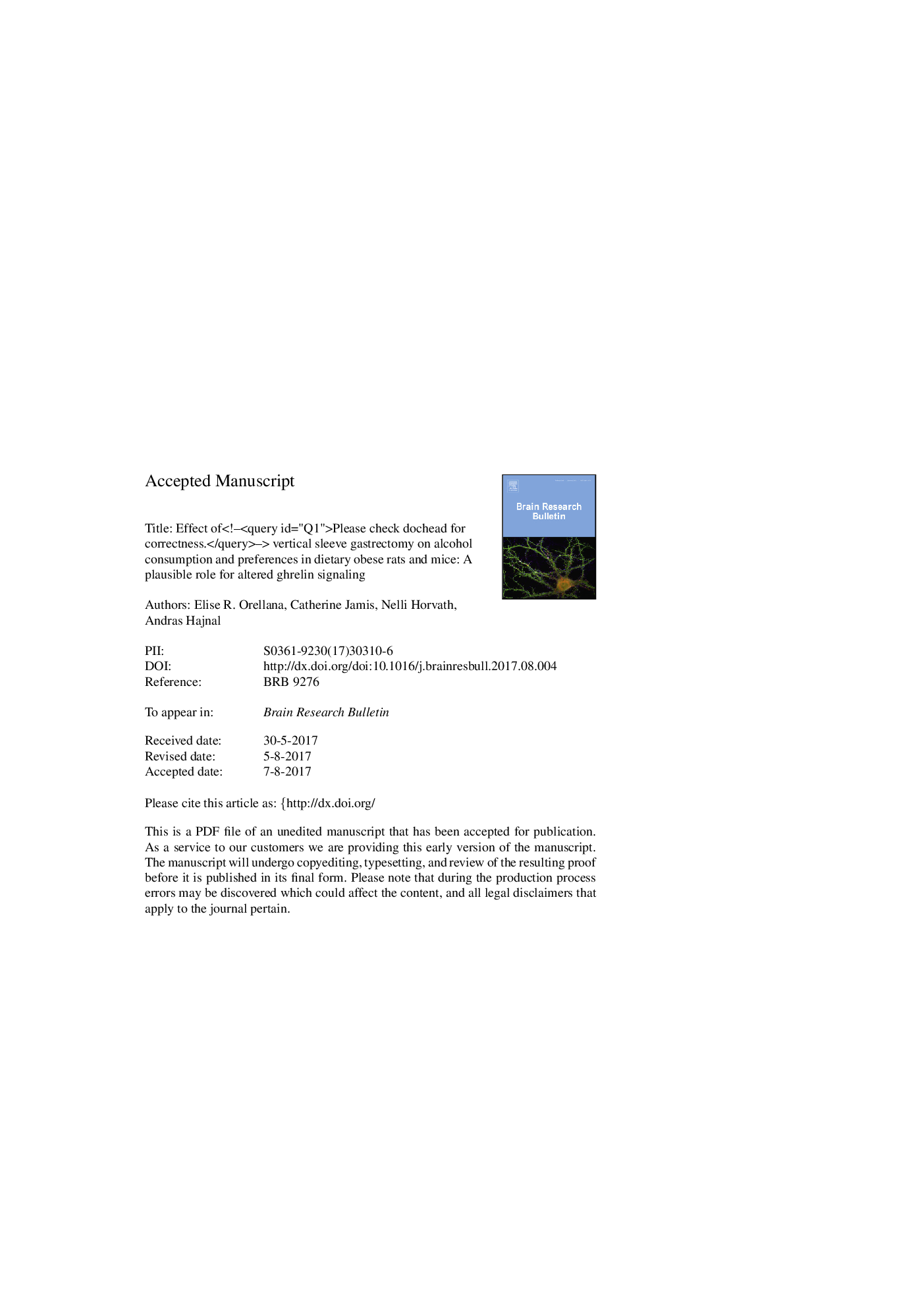| کد مقاله | کد نشریه | سال انتشار | مقاله انگلیسی | نسخه تمام متن |
|---|---|---|---|---|
| 8838956 | 1613219 | 2018 | 33 صفحه PDF | دانلود رایگان |
عنوان انگلیسی مقاله ISI
Effect of vertical sleeve gastrectomy on alcohol consumption and preferences in dietary obese rats and mice: A plausible role for altered ghrelin signaling
ترجمه فارسی عنوان
اثر گاسترکتومی آستین عمودی بر مصرف الکل و ترجیحات در موش و موش چاق رژیم غذایی: یک نقش قابل اعتماد برای سیگنالینگ خورلاین
دانلود مقاله + سفارش ترجمه
دانلود مقاله ISI انگلیسی
رایگان برای ایرانیان
کلمات کلیدی
موضوعات مرتبط
علوم زیستی و بیوفناوری
علم عصب شناسی
علوم اعصاب سلولی و مولکولی
چکیده انگلیسی
Vertical sleeve gastrectomy (VSG) and Roux-en-Y gastric bypass (RYGB) are the most common surgical options for the treatment of obesity and metabolic disorder. Whereas RYGB may result in greater and more durable weight loss, recent clinical and pre-clinical studies in rats have raised concerns that RYGB surgery may increase risk for alcohol use disorder (AUD). In contrast, recent clinical reports suggest a lesser risk for AUD following VSG, although no preclinical studies have been done to confirm that. Therefore, the present study sought to determine the effects of VSG on ethanol intake and preferences in rodent models using protocols similar to those previously used in animal studies for RYGB. Male Sprague Dawley rats and male C57B6 mice were made obese on a high fat diet (60%Â kcal from fat) and received VSG or no surgery (controls). All animals then were given access to increasing concentrations of ethanol (2%, 4%, 6%, and 8%), presented for few days each. Compared to controls, VSG rats consumed significantly less of 2, 6 and 8% ethanol and showed significantly reduced preferences to 6 and 8% ethanol over water. VSG mice also displayed reduced intake and preference for 6 and 8% ethanol solutions. After a two-week period of forced abstinence, 8% ethanol was reintroduced and the VSG rats and mice continued to exhibit reduced consumption and less preference for ethanol. Regarding the underlying mechanism, we hypothesized that the removal of the ghrelin producing part of the stomach in the VSG surgery is a possible contributor to the observed reduced ethanol preference. To test for functional changes at the ghrelin receptors, the VSG and control rats were given IP injections of acyl-ghrelin (2.5Â nmol and 5Â nmol) prior to ethanol access. Neither concentration of ghrelin resulted in a significant increase in 8% ethanol consumption of VSG or control subjects. Next, the rats were given IP injections of the ghrelin receptor antagonist, JMV (2.5Â mg/kg body weight). This dose induced a significant reduction in 8% ethanol consumption in the VSG group, but no effect on ethanol intake in the controls. While ghrelin injection was uninformative, increased sensitivity to subthreshold doses of the ghrelin receptor antagonist may indicate reduced ghrelin signaling following VSG. Overall, these findings suggest that bariatric patients with increased susceptibility to AUD may benefit from receiving VSG instead of RYGB surgery, and that changes in ghrelin signaling, at least in part, may play a role in the differential AUD risks between the two most commonly performed bariatric surgical procedures.
ناشر
Database: Elsevier - ScienceDirect (ساینس دایرکت)
Journal: Brain Research Bulletin - Volume 138, April 2018, Pages 26-36
Journal: Brain Research Bulletin - Volume 138, April 2018, Pages 26-36
نویسندگان
Elise R. Orellana, Catherine Jamis, Nelli Horvath, Andras Hajnal,
